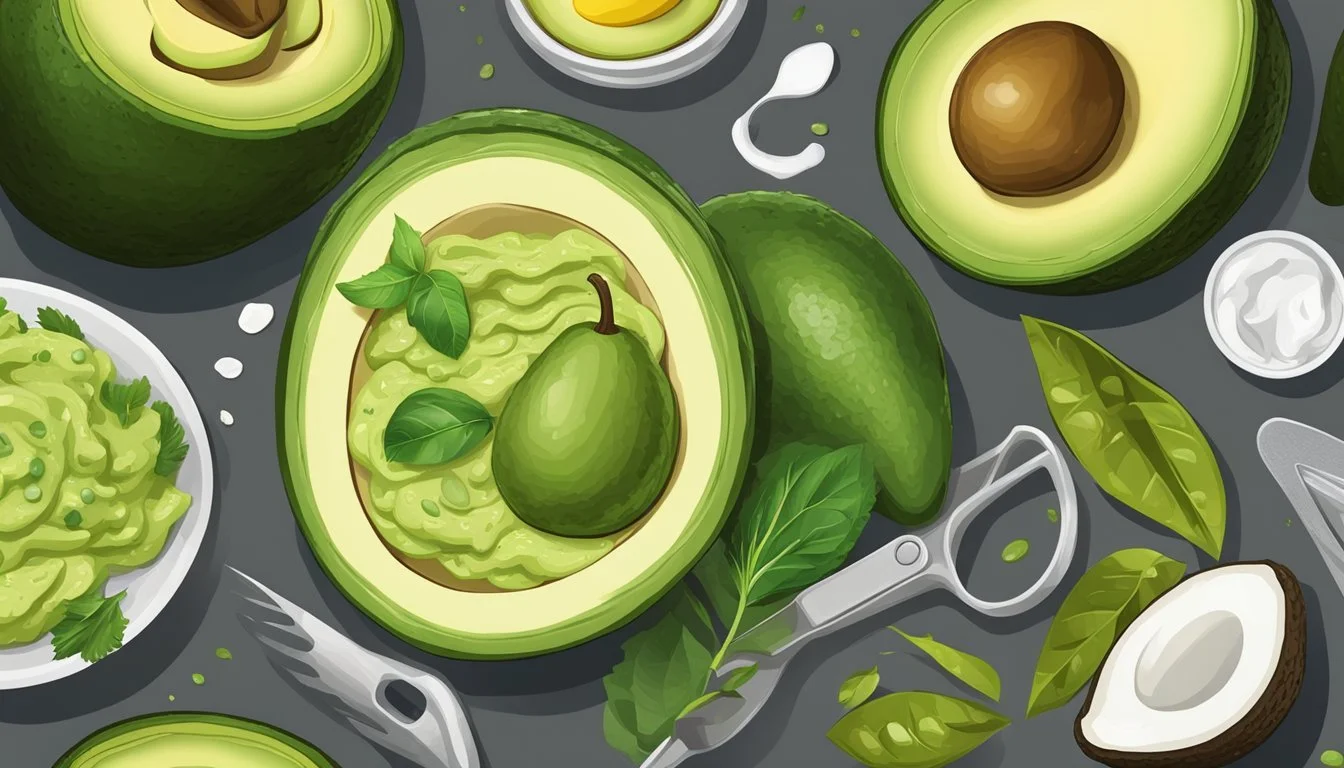How Many Servings of Avocado Per Day May Be Excessive
Understanding Healthy Limits
Avocados are widely regarded as a healthy food, rich in monounsaturated fats, fiber, and a variety of vitamins and minerals. They have become a staple in many diets around the world, praised for their ability to support heart health and weight management. Despite their health benefits, it's important to consider portion size when incorporating avocados into a diet. Like all plant foods, avocados should be consumed in moderation, and understanding the recommended serving size can help maintain balance in one's nutritional intake.
Determining the appropriate serving size of avocado depends on individual dietary needs and overall caloric intake. Generally, dietitians suggest that one-third to one-half of a medium avocado (about 50 to 100 grams) constitutes a single serving. This quantity ensures that consumers can reap the nutritional benefits of the fruit without excessive calorie consumption. The high fiber content and heart-healthy fats in avocados are integral in making them a fulfilling addition to meals, potentially aiding in satiety and weight control when consumed in the recommended amount.
Some studies suggest that eating one avocado per day can be part of a healthy diet, particularly for improving cholesterol levels in overweight individuals. However, given that a whole avocado contains approximately 240 calories and 24 grams of fat, it's critical to balance avocado intake with other sources of healthy fats such as seeds, nuts, and oils, to meet but not exceed daily nutritional fat requirements. Hence, while avocados are a beneficial component of a nutrient-dense diet, awareness of portion size is key in avoiding excessive consumption.
Nutritional Profile of Avocado
Avocado is rich in vitamins, minerals, and healthy fats. Its nutritional value is appreciated for being both a calorie-dense and nutrient-rich fruit, which provides a myriad of health benefits.
Vitamins and Minerals Content
Avocado is a powerhouse of essential vitamins and minerals. It contains significant amounts of potassium, surpassing even bananas, and is a great source of vitamin K, which is important for bone health. The fruit is also rich in folate, beneficial for DNA synthesis and repair, and offers vitamin C, vitamin E, and B vitamins. Additionally, avocado contains magnesium, necessary for many bodily functions, and antioxidants like lutein and carotenoids, which are beneficial for eye health. The fat-soluble vitamins in avocado, which include vitamins E and K, are better absorbed when eaten with fats, making the avocado's own content of healthy fats especially valuable.
Potassium: Vital for maintaining electrical gradients in the body's cells and serves numerous critical functions.
Vitamin K: Essential for bone health and blood clotting.
Folate: Important for normal cellular function and tissue growth.
Vitamin E: A potent antioxidant that protects against oxidative damage.
Vitamin C: Necessary for the growth, development, and repair of all body tissues.
B Vitamins: Contribute to energy production and the maintenance of proper brain function.
Magnesium: Involved in over 300 enzymatic reactions in the body, including metabolism and protein synthesis.
Lutein & Carotenoids: Antioxidants that support eye health.
Caloric Value and Healthy Fats
Contrary to many fruits, avocados are relatively high in calories, primarily due to their fat content. A whole medium avocado contains about 240 calories, mostly from fat. However, these are predominantly monounsaturated fats, including oleic acid, which is associated with various health benefits. Roughly 15 grams of the fat in an avocado is monounsaturated, which supports heart health and can help reduce bad cholesterol levels. About 3 grams are saturated fat, which should be consumed in moderation. The high amount of fiber—about 10 grams in a medium avocado—alongside fat contributes to the feeling of fullness and can aid in weight management. The healthy fats in avocados can assist with the absorption of other fat-soluble vitamins and nutrients, making it a beneficial addition to a balanced diet.
Calories: Approximately 240 calories in a medium avocado.
Monounsaturated Fat: Includes oleic acid, known for its beneficial effects on health.
Saturated Fat: A small portion of the total fat content, important to monitor for overall health.
Fiber: Contributes to satiety and aids in digestion.
Health Benefits
Avocados offer a myriad of health benefits ranging from heart to cognitive health due to their compositional richness in beneficial nutrients. Below are the specific health advantages organized into key areas.
Cardiovascular Health
Avocados are high in monounsaturated fats, which are recognized for improving heart health by lowering levels of LDL (bad) cholesterol while maintaining or increasing HDL (good) cholesterol levels. The American Heart Association suggests including monounsaturated fats as they can reduce the risk of heart disease. Additionally, avocados contain potassium, which is vital in helping to manage blood pressure.
Digestive and Gut Health
Dietary fiber found in avocados is essential for digestive health, aiding in the prevention of constipation and promoting a healthy digestive tract. Regular consumption of fiber-rich foods like avocados supports gut health by contributing to a stable and well-functioning gastrointestinal system, which directly influences the immune system's effectiveness.
Cognitive and Eye Health
Avocados contain antioxidants such as lutein and zeaxanthin, which are beneficial for eye health and may help protect against age-related macular degeneration. Furthermore, the high oleic acid content in avocados has been linked to improved brain function and memory performance, indicating that avocados may be a valuable food for cognitive maintenance.
Weight Management and Metabolism
Despite being calorie-dense, avocados can contribute to weight management by promoting satiety, which in turn may help prevent overeating and unintentional weight gain. Their high fiber content, along with healthy monounsaturated fats, can assist in maintaining a healthy weight and potentially reduce the risk of metabolic syndrome.
Recommended Consumption
When incorporating avocado into a healthy diet, it's essential to consider appropriate serving sizes and the potential impact on overall nutrition. This section will uncover the daily recommended serving of avocado and explore the factors contributing to the maximum intake one should consider.
Daily Serving Size
Nutritionists often recommend that a single serving of avocado is approximately one-third of a medium fruit. This serving size fits into a balanced diet, providing essential nutrients without excessive calorie intake. According to the American Heart Association, including a serving of avocado can be part of an overall healthy diet due to its beneficial monounsaturated fats.
Maximum Intake Considerations
Dietitians caution against consuming excessive amounts of any food, including avocados, due to their calorie and fat content. A practical limit to consider is:
Half an avocado for individuals with higher calorie needs
Up to one full avocado per day in the context of an otherwise nutrient-dense, balanced diet with adequate caloric intake
However, one's personal dietary needs and habits should dictate their portion sizes. Those monitoring weight or specific health issues should adjust their intake accordingly, potentially seeking the advice of a healthcare provider.
Avocado in the Diet
Avocados are a versatile fruit that can enhance a variety of meals with their healthy fat content, but portion control is crucial to avoid excessive calorie intake.
Inclusion in Meals and Recipes
Avocados can be seamlessly integrated into meals and recipes. They are a popular choice for avocado toast, which typically consists of mashed avocado on whole-grain bread. Additionally, avocado salad and guacamole are common dishes that showcase the fruit's rich texture and flavor. Beyond these, dietitians often recommend using avocados in smoothies for creaminess or in salads to add satiety. For those wanting to mix things up, avocado hummus serves as a nutritious dip option.
Here are common ways to include avocados in meals:
Breakfast: Sliced avocado or avocado toast.
Lunch: Avocado salad or as a topping on sandwiches.
Dinner: Guacamole or sliced as a garnish on soups and main dishes.
Snacks: Avocado hummus with vegetables or baked avocado fries.
Alternative Healthy Fats
While avocados are a source of healthy monounsaturated fats, they also provide a significant amount of calories. It's important to balance avocado intake with other sources of healthy fats. Nuts, seeds, olive oil, and avocado oil are excellent alternatives. They all contribute valuable monounsaturated and polyunsaturated fats, which are beneficial for heart health.
List of healthy fat sources to consider:
Nuts: Almonds, walnuts, and cashews.
Seeds: Flaxseed, chia seeds, and hemp seeds.
Oils: Olive oil, avocado oil, and canola oil.
Incorporating a variety of fats into one's diet can help ensure that the consumption of saturated fats is limited, promoting overall cardiovascular health.
Potential Risks and Considerations
While avocados are nutritious, overconsumption may pose certain risks that consumers must consider, including medication interactions and potential for allergic reactions. Readers should be aware that although avocados can be beneficial for conditions like heart disease due to their healthy fat content, moderation is key.
Interactions with Medication and Health Conditions
Avocados are high in vitamin K, which can interfere with blood-thinning medications, such as warfarin. Patients on such medications need to maintain a consistent intake of vitamin K; sudden increases can decrease the efficacy of the medication. Additionally, because avocados are a rich source of monounsaturated fats, they can help improve cholesterol levels, but they may impact patients with pancreatitis or other conditions that require a low-fat diet.
Medication: Caution with blood-thinners due to vitamin K
Cholesterol: Helpful in moderation
Fat Content: May exacerbate certain conditions like pancreatitis
Allergy and Intolerance
Although rare, avocado allergies do occur and can elicit symptoms ranging from mild to severe, such as hives, itching, or anaphylaxis. Latex-allergic individuals may also be sensitive to avocados due to cross-reactivity. Moreover, avocados contain FODMAPs (fermentable oligo-, di-, mono-saccharides and polyols), which may trigger digestive discomfort in those with Irritable Bowel Syndrome (IBS).
Allergic Reactions: From hives to anaphylaxis, particularly in latex-allergic individuals
FODMAPs: Can cause distress in IBS patients
Storage and Food Safety
Proper storage of avocados is crucial to maintaining their quality and ensuring food safety. Avocados, like any other food item, are subject to spoilage when not stored correctly.
Optimal Preservation Methods
To maintain the freshness of an avocado, it should be stored at room temperature until it ripens. Once ripe, avocados can be stored in the refrigerator to slow down the ripening process and extend their usability. Unripe avocados should not be refrigerated, as this can halt the ripening altogether.
For a cut avocado, it is recommended to preserve the remaining portion with one of the following methods to slow down oxidation:
Acidic agents: Brush the exposed flesh with lemon or lime juice.
Olive oil: Apply a thin layer of olive oil over the surface.
Airtight container: Store the avocado in an airtight container or tightly wrap it in cling film.
Onion method: Place a chunk of red onion in an airtight container with the cut avocado; the gases emitted by the onion can help keep it fresh.
If the avocado has been prepared into guacamole or another dish, similar storage methods apply. The use of airtight containers can prevent air from reaching the product, thus prolonging its shelf life. The key is to minimize the avocado's exposure to air to prevent the browning process that occurs due to oxidation.
For food safety, always handle avocados with clean hands and utensils. Avocados with mold or an off smell should be discarded. Proper storage not only prevents waste but also ensures avocados are enjoyable and safe to eat.
Cultural and Environmental Aspects
Avocados have become a superfood staple in various cultures, but their popularity comes with environmental concerns. This section explores the complexities of avocado production and sustainability.
Global Avocado Production and Trade
Global trade in avocados is dominated by Mexico, which is the largest producer and exporter of this fruit. They supply a significant portion of the demand, fueled by avocados' status as a superfood in diverse cultures. With the United States as one of the primary importers, the cultural appetite for avocados has influenced agricultural practices in multiple countries, impacting global trade.
Top Avocado Producing Countries (2023):
Mexico
Dominican Republic
Peru
Colombia
Indonesia
Mexico's dominance in the market is clear, but other regions are emerging to meet the ever-increasing international demand for avocados.
Ecological Footprint and Sustainability
The ecological footprint of avocado production is a growing concern, as it encompasses greenhouse gas emissions, land use, and water consumption. On average, every pound of avocados might result in approximately 0.85 kg of CO2 equivalent emissions, a clear marker of its impact on sustainability. The challenges involve:
Water Usage: Avocados require significant amounts of water to grow. Especially in areas prone to drought, this can lead to tension between agricultural needs and local communities.
Land Use: Expansion of avocado farming often leads to deforestation, which makes it a controversial practice in terms of sustainability.
Efforts to make avocado farming more sustainable are on the rise, but they face significant challenges due to the existing structure of the industry and the relentless market demand.









